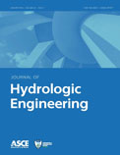
JOURNAL OF HYDROLOGIC ENGINEERING
Scope & Guideline
Exploring the Future of Water Engineering
Introduction
Aims and Scopes
- Hydrological Modeling:
Development and application of various hydrological models to simulate and predict water flow, sediment transport, and other hydrological processes across diverse landscapes. - Climate Change Impact Analysis:
Investigating the effects of climate variability and change on hydrological systems, including changes in precipitation patterns, runoff, and flood frequency. - Water Resource Management:
Research aimed at improving strategies for sustainable water resource management, including the design and evaluation of stormwater management systems and flood mitigation strategies. - Data-Driven Approaches and Machine Learning:
Utilizing advanced data analytics, machine learning, and artificial intelligence techniques to enhance hydrological predictions and model performance. - Soil-Water Interactions:
Exploring the interactions between soil properties and water movement, focusing on infiltration, groundwater recharge, and soil erosion processes. - Hydraulic Engineering:
Studies related to the design and analysis of hydraulic structures, including dams, levees, and urban drainage systems. - Integrated Watershed Management:
Research that emphasizes the integration of hydrological, ecological, and socio-economic factors for effective watershed management.
Trending and Emerging
- Machine Learning and AI in Hydrology:
There is an increasing trend towards the application of machine learning and artificial intelligence for hydrological modeling, enhancing predictive capabilities and data analysis. - Climate Change Adaptation Strategies:
Research focused on developing and assessing strategies for adapting to climate change impacts on hydrological systems is gaining prominence, addressing urgent environmental challenges. - Green Infrastructure and Low-Impact Development (LID):
Emerging interest in sustainable urban water management practices, including green infrastructure and LID techniques, as solutions to mitigate flooding and manage stormwater. - Integrated Modeling Approaches:
A growing trend in integrating various modeling approaches, including hydro-meteorological, ecological, and socio-economic models, to address complex water resource challenges. - Remote Sensing Applications:
Increased utilization of remote sensing technologies for hydrological monitoring and assessment, providing valuable data for modeling and management efforts. - Resilience and Risk Assessment:
An emerging focus on assessing resilience and risks associated with hydrological extremes, including floods and droughts, to inform management strategies.
Declining or Waning
- Traditional Hydrology Methods:
There is a noticeable decrease in papers focusing solely on classical hydrology methods without integration of modern techniques, indicating a shift towards more innovative approaches. - Static Hydrological Models:
Research centered on static or traditional models is waning, as the field increasingly embraces dynamic modeling that incorporates real-time data and adaptive methodologies. - Regional Studies without Broader Implications:
Studies that focus narrowly on specific regional hydrological issues without broader applications or implications are appearing less frequently, reflecting a trend towards more universally applicable research. - Single-Factor Analysis:
Research focusing on single variables or factors affecting hydrology is declining in favor of multi-factor analyses that consider complex interactions within hydrological systems.
Similar Journals
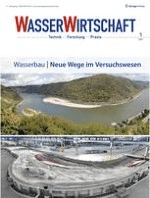
WasserWirtschaft
Shaping the future of water management through rigorous research.WasserWirtschaft is a renowned academic journal dedicated to the critical field of water science and technology. Published by SPRINGER VIEWEG-SPRINGER FACHMEDIEN WIESBADEN GMBH, this journal has been a vital resource for researchers, professionals, and students since its inception in 1973, covering an extensive range of topics pertinent to water management, engineering, and environmental sustainability. Although it is currently ranked in the Q4 category of the Water Science and Technology category as per the 2023 Scopus metrics, with a ranking of #246 out of 261, the journal is committed to enhancing the discourse surrounding water resource management through high-quality, peer-reviewed articles. The journal does not operate on an Open Access basis, ensuring that its content is curated and accessible to subscribers while promoting rigorous academic standards. With its historical significance and focus on contemporary water-related challenges, WasserWirtschaft remains an essential publication for stakeholders aiming to advance the science and technology of water resources in a rapidly changing world.

WATER RESOURCES MANAGEMENT
Pioneering Insights for Effective Water Resource StrategiesWATER RESOURCES MANAGEMENT is a prestigious journal published by SPRINGER, renowned for its contribution to the fields of Civil and Structural Engineering as well as Water Science and Technology. Operating since 1987, this journal has established itself as a vital resource for researchers, professionals, and students alike, boasting a remarkable impact factor and a Q1 designation in both relevant categories as of 2023. The journal is indexed in Scopus, achieving commendable ranks—34th in Environmental Science and 62nd in Civil and Structural Engineering, placing it in the top percentiles of its fields. Although it does not offer open access, WATER RESOURCES MANAGEMENT serves as a comprehensive platform for disseminating innovative research, discussions, and case studies that address the global challenges of water resource management. With a commitment to fostering knowledge and advancing the understanding of integrated water management solutions, this journal is indispensable for anyone engaged in these critical scientific domains.
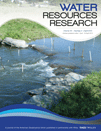
WATER RESOURCES RESEARCH
Connecting Science and Policy for Water SustainabilityWATER RESOURCES RESEARCH, published by the American Geophysical Union, stands as a premier journal in the field of environmental science, specifically within the domain of water science and technology. With an impressive impact factor and a categorical ranking of Q1 for 2023, it ranks within the top 10% of relevant journals, evidencing its critical role in advancing the knowledge and application of water resources research. Since its inception in 1965, the journal has been dedicated to rigorous research that addresses pressing global challenges related to water resource management, hydrology, and environmental sustainability. The journal's comprehensive publication scope aims to present innovative findings and methodologies that can shape effective policies and practices. Although it does not offer open access, the robust research it publishes continues to influence academics and practitioners alike, ensuring its position as an essential resource for anyone engaged in the pursuit of water-related knowledge and solutions.

JOURNAL OF THE AMERICAN WATER RESOURCES ASSOCIATION
Leading the charge in water resource research since 1967.The JOURNAL OF THE AMERICAN WATER RESOURCES ASSOCIATION, published by Wiley, is a premier platform dedicated to advancing the field of water resource management and research. With an ISSN of 1093-474X and an impressive Q1 ranking in multiple categories, including Earth-Surface Processes, Ecology, and Water Science and Technology, this journal serves as a vital resource for professionals, researchers, and students alike. Established in 1967 and set to converge through 2024, it has consistently published cutting-edge research that influences policy and practice in water resource management. The journal's open access option enhances its reach, ensuring that critical findings are accessible to a wider audience. The Scopus rankings further underscore its impact, placing it in the top quartile within its fields, highlighting its importance in shaping scholarly discourse. As a significant contributor to the understanding and management of freshwater systems, the journal offers a crucial means for sharing insights and fostering collaboration in the vital realm of water resources.

Journal of Hydrology-Regional Studies
Unveiling critical knowledge for water sustainability.Journal of Hydrology-Regional Studies, published by ELSEVIER in the Netherlands, stands as a leading open-access platform since 2014 for disseminating high-quality research in the fields of hydrology and water management. With an impressive impact factor and recognition as a Q1 journal in both Earth and Planetary Sciences and Water Science and Technology categories, it emphasizes regional studies that advance understanding of hydrological processes and their implications for sustainable management practices. The journal has established a significant global reach, evident from its Scopus rankings, which place it in the top percentiles within its disciplines, fostering a dynamic exchange of ideas among researchers, professionals, and students alike. By mobilizing critical insights and innovative solutions in hydrology, this journal aims to contribute to solving the pressing water-related challenges faced by our society.

Journal of Hydrology and Hydromechanics
Advancing knowledge in fluid dynamics and water science.Journal of Hydrology and Hydromechanics, published by SCIENDO, is a prominent open access journal that has been disseminating crucial research findings in the fields of fluid flow, mechanical engineering, and water science since its inception in 1973. With its open access model established in 2009, the journal ensures that innovative research is available to a global audience, enhancing the visibility and impact of studies related to hydrological systems and their applications. The journal holds a commendable position within the academic community, reflected in its category quartiles, achieving Q2 rankings in 2023 across key areas such as Fluid Flow and Transfer Processes, Mechanical Engineering, and Water Science and Technology. Its Scopus rankings further highlight its relevance, placing it among the top journals in its categories. The Journal of Hydrology and Hydromechanics not only serves as a vital resource for researchers and professionals aiming to advance hydrological knowledge but also provides students with a wealth of information to better understand the complexities of water dynamics and associated engineering challenges.
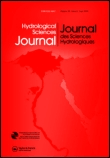
Hydrological Sciences Journal
Bridging research and practice in hydrological sciences.Hydrological Sciences Journal, published by Taylor & Francis Ltd, is a leading peer-reviewed publication dedicated to advancing the field of hydrology, spanning topics from water management to climate impacts on hydrological systems. With an impressive impact factor and a noted Q1 category ranking in Water Science and Technology, the journal occupies a pivotal role in the academic landscape, facilitating high-quality research dissemination since its inception in 1982. The journal is indexed in Scopus, holding a commendable rank of #48 out of 261 in the Environmental Science category, placing it in the 81st percentile among its peers. Although it does not offer Open Access options, the journal ensures extensive reach and readership through institutional subscriptions. As it converges toward its milestone of 2024, the Hydrological Sciences Journal remains an indispensable resource for researchers, professionals, and students eager to explore the latest advancements and methodologies in hydrological research.

Water Resources
Innovating for a sustainable future in water management.Water Resources, a prominent journal published by MAIK NAUKA/INTERPERIODICA/SPRINGER, focuses on the critical and evolving field of water science and technology. Established in 1976 and with a long-standing commitment to advancing knowledge, this journal explores interdisciplinary research that addresses the challenges surrounding water resource management, quality, and sustainability. With an impact factor positioned within the Q3 category of its field, it holds a notable Scopus rank (#181/261) in Environmental Science, emphasizing its role in driving scholarly discourse. While currently not open access, Water Resources provides vital insights for researchers, professionals, and students, making it an essential resource for those seeking to innovate and implement effective water management solutions. To stay ahead in a domain that is increasingly paramount to global sustainability efforts, consider engaging with the latest research published in this vital journal.
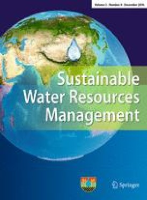
Sustainable Water Resources Management
Pioneering research for a water-secure future.Sustainable Water Resources Management is an esteemed journal focusing on the critical field of water resource management in the context of sustainability. Published by Springer International Publishing AG, this journal serves as a vital platform for researchers, policymakers, and practitioners to disseminate cutting-edge research and innovative practices aimed at addressing global water challenges. With an impressive impact factor aligned with its Q2 ranking in Water Science and Technology and Q3 in Renewable Energy, Sustainability, and the Environment, it maintains a robust reputation in its field, evidenced by its Scopus rankings. Covering a diverse range of topics from integrated water resource management to the nexus between water and energy, Sustainable Water Resources Management is committed to fostering knowledge exchange and encouraging interdisciplinary dialogue among its audience. This journal, operating under strict academic rigor, plays an essential role in advancing sustainable practices and is open from 2015 to 2024, making it a relevant resource in today’s rapidly evolving environmental context.

Hydrology Research
Advancing water science for a sustainable future.Hydrology Research, a leading academic journal published by IWA Publishing, is dedicated to advancing the field of water science and technology. With an impressive impact factor and a Q2 ranking in its category, the journal plays a pivotal role in disseminating innovative research and practices in hydrology. Established in 1973 and transitioning to an Open Access model in 2020, it provides unrestricted access to high-quality articles that cover a broad spectrum of topics, including hydrological processes, water management, and environmental impact assessments. Situated in Denmark, Hydrology Research continues to thrive as an essential platform for researchers, professionals, and students alike, encouraging the exchange of ideas that contribute to sustainable water solutions worldwide. With a comprehensive coverage of research converging from 1973 to 2024, it stands as a testament to ongoing progress in the water science community.